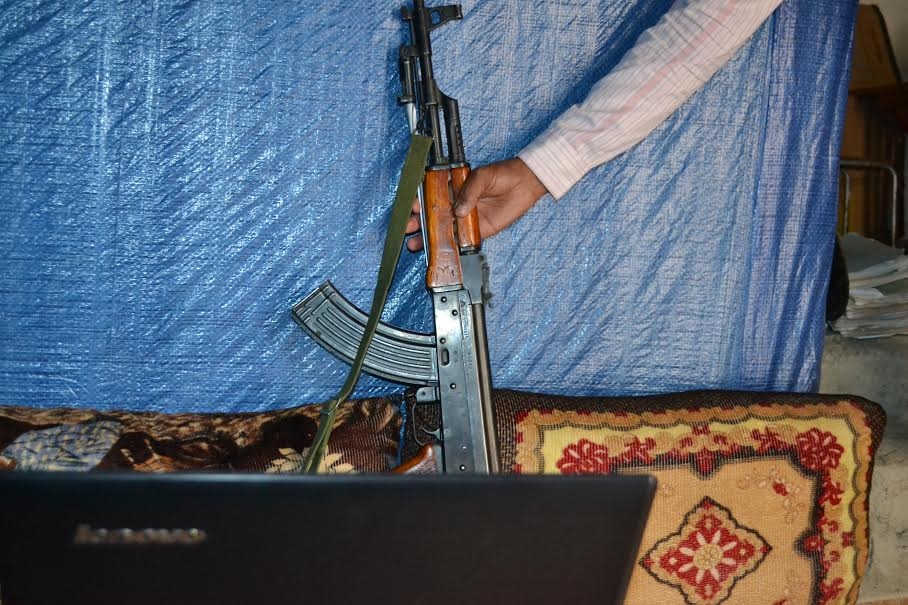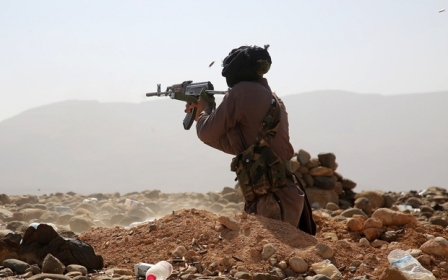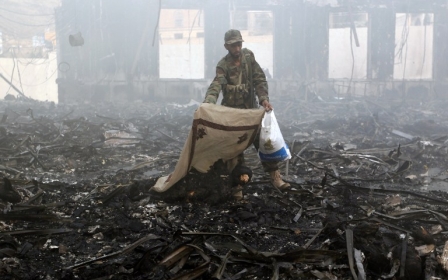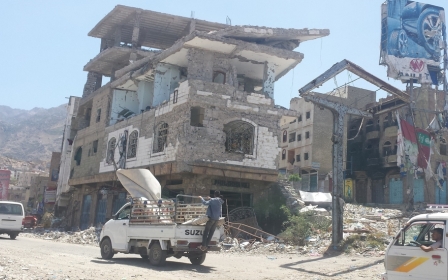Fighting for a university degree in Yemen's Taiz - street by street

TAIZ, Yemen - The main goal of 21-year-old Ibrahim, youngest of five siblings and the only one to reach university, is to complete his degree and secure a better future.
That, and staying alive.
To pay for his university studies, Ibrahim, who asked that his real name not be revealed, must brave the sniper-infested streets of Taiz city as a part-time soldier in Yemen's bitter civil war.
The city that has been in a state of siege for almost two years, in a country torn by war since early 2015.
Fighting between rebel Houthis from the north of the country and forces loyal to exiled President Abd Rabbuh Mansour Hadi has caused the deaths of more than 10,000 civilians in a conflict the UN ranks as one of the world's worst humanitarian crises.
New MEE newsletter: Jerusalem Dispatch
Sign up to get the latest insights and analysis on Israel-Palestine, alongside Turkey Unpacked and other MEE newsletters
Last month, the UN chief for humanitarian affairs, Stephen O'Brien, warned that Yemen faces famine this year, with wheat supplies running low and supply routes disrupted.
UNICEF, the organisation's children's fund, said more than two million children were among the 3.3 million people suffering from acute malnutrition across Yemen, with Taiz one of the three worst-affected areas.
Ibrahim is a computer science student at Taiz University.
He used to depend on his father to pay for his studies, but that support ended when the war prevented his cattle-trader father from moving between fought-over provinces.
That left Ibrahim with a tough choice - join the battlefield as a paid fighter, or become a building labourer, like two of his brothers.
"My father does not work nowadays and my family depends on charitable people for food, so it is difficult to complete my studies at college.
"I don't want to stop studying and work as a labourer, so I tried to think of a practical solution," Ibrahim told Middle East Eye.
"Some of my friends had already joined the battlefield as fighters and they were paid 60,000 rials [$200] per month, so they encouraged me to join up."
Ibrahim's father didn't like the idea, but when he found himself unable to help his son, he allowed him to go.
Ibrahim said: "It was last June when a colleague called and told me to go to al-Khiami military camp [20km from Taiz] to receive training, and that the leadership would accept me as a fighter.
"Immediately, I left my house ... I cannot say that I was happy. Rather, I was regretting my luck."
Ibrahim received a month's basic training before he was given a Kalashnikov and sent with other pro-government fighters to the Haifan front, some 70km from Taiz. There, some of his colleagues were killed as they stopped a Houthi advance towards the main road that connects with Lahj and the key southern port city of Aden. Ibrahim was lucky.
"I didn't want to be in the front line, as I had no experience fighting. So I insisted on staying at the back and the leaders agreed. I also told them I was a student, and they allowed me to fight for three days a week," he said.
Ibrahim's fighting days are now spent mostly in different parts of Taiz city outskirts, close enough to allow him to continue his studies. He has managed to be one of the top students in his class.
"I pay YR80,000 [$266] a year for the university, and spend about YR30,000 [$100] a month on living costs. I try to save about YR20,000 [$66] a month. I am planning to stop fighting as soon as I have enough savings to enable me to complete my studies."
Ibrahim is one of numerous students from Taiz who have joined the battlefield for the sake of money.
Mohammed Abdulwadood, a computer science professor at Taiz University, confirmed that many university students have joined up as fighters, and that some have been killed.
"Dozens of the university's students have joined the battle for different reasons. We know about them, but we cannot offer any solution, as it is down to the conviction of the student and his family," he told MEE.
Abdulwadood said the difficult economic situation played a main role in encouraging the students to leave the university for the battlefield, adding that some had left the university forever.
The grinding conflict has had a devastating impact on the economy and job prospects in Taiz and across the country. Private companies and factories in Taiz have been forced to close, while government employees across the province, as in others, have not received salaries since August 2016. New building construction has also ground to a halt.
Students as breadwinners and fighters
Abdullah, 23, who also asked that his real name not be revealed, an Arabic language student also at Taiz University, was hit in the right hand by a Houthi sniper last December, when he was fighting on the al-Silo front, about 15km south of Taiz city.
His classmates were shocked to discover he was a fighter. Until his injury he had managed to keep up attendance at his lectures by fighting three days a week, like Ibrahim.
"I am not proud to be a fighter, but I am an orphan and the oldest of four siblings. I have to study and eke out my money to look after my family.
"Before the war I sold clothes in the afternoons, but nowadays I cannot make a proper profit from that work. Our need for food and my desire to study forced me to join the battle," he told MEE.
Abdullah joined the war in March 2016, and has fought on several fronts. Now, after being wounded, he no longer has to fight, but still receives his salary.
"I will focus on my studies, and after I graduate from college I will decide what to do. But fighting will not be one of the choices," he said. He also hopes that his hard work will help other family members get an education.
One cousin, Hisham, said Abdullah - whose father died four years ago - has worked hard to keep his family from starvation, as he is the only breadwinner. "Allah will protect Abdullah everywhere because he ekes out his money for orphans and does not believe in fighting. [The need for] money forced him to do it."
If a state-run foundation for orphans could help the family, he said, Abdullah would not have to fight. But for now the work of such organisations has been halted by the war.
Naef Nouradeen, who specialises in social customs at the education office in Taiz, said the city's economic crisis was forcing different kinds of people to fight to earn money, including educated people and some teachers.
"I know many teachers and public employees who have joined the war to make money, since they don't have any other source of income."
Nouradeen urged the government "to try to solve the economic crisis and pay the salaries of all employees so they can live safely".
Pen and Kalashnikov
Ghalab al-Rofaid, a leader of the resistance in Taiz province and a recruit trainer, confirmed that many students and educated people had joined the Popular Resistance in the past two years. But he said they did so purely to resist the "invaders" - the rebel Houthis - who were trying to take over Taiz.
"We need to send a message to the Houthis and [former president Ali Abdullah] Saleh's forces that we are educated people, but we do not hesitate to fight if Taiz needs us. Our slogan is always a pen and a Kalashnikov," Rofaid told MEE.
"Taiz is the cultural capital of Yemen, so it is not strange that educated people will fight to liberate it. Educated people know more than others the importance of liberation, and they teach patriotism to others."
Rofaid said some groups in the Popular Resistance, forces loyal to President Hadi, offer students facilities so they can continue to study even when they are fighting.
Rofaid said: "There is a brigade in the Popular Resistance called the Students' Brigade. They usually coordinate with students to give them the chance to continue studying, but some of them insist on staying in the battle to fight. We do not prevent anyone from studying."
The student-turned-fighter Ibrahim said he knows hundreds of university students who are fighting with the Popular Resistance.
And while Ibrahim is a fighter, he says he has not yet killed anyone. "It is not easy to kill a man. Allah may forgive me for any sin, but not killing people. I hope the war will end soon and we can resume our safe lives."
Middle East Eye delivers independent and unrivalled coverage and analysis of the Middle East, North Africa and beyond. To learn more about republishing this content and the associated fees, please fill out this form. More about MEE can be found here.




